Another F for Alphabet: after abandoning Android tablets last year, Google retreats from C...
After dumping support for its last remaining Android Pixel C tablet last spring, Google is starting off 2019 with another major retreat in its hardware lineup -- including the cancellation of various concepts in development.
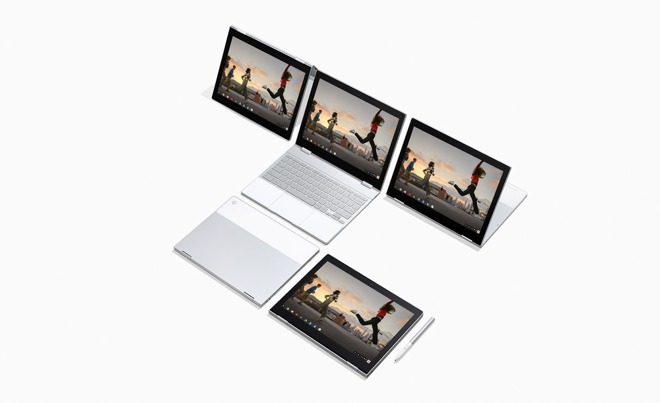
Google devoted a lot of engineering work into products nobody is buying
This week, Nick Bastone wrote for Business Insider that the search giant began reassigning engineers and program managers in its Create hardware division that builds its Pixelbook and Pixel State, both of which run Chrome OS.
Pundits have been constantly wringing their hands about the future of Apple's iPads and MacBooks, deeply concerned that they may end up hitting a plateau where Apple is merely servicing the same pool of the few hundred million users who can afford high end mobile devices.
However, nobody has been even slightly worried about the fact that every attempt Google has made in the hardware computing arena over the past decade has failed with spectacular embarrassment, making no money and gaining even less of a foothold in the market for personal computing hardware than Microsoft's Surface.
Across the entire stretch of years where Google has struggled to find a netbook, tablet, slate, notebook or some other form factor that it could sell with Android, Chrome OS or some mix of the two, it has only lost money and wasted time. Yet effectively nobody has ever predicted that Google would eventually give up on tablets or netbooks or other hardware experiments.
While Google has been patted on the back for a decade of trying, Apple's Macs and iPads have generated about $400 billion in sustainable margin revenues since 2010. With those funds, Apple has in part created its own internal Intel developing the latest A12X Bionic, and has funded a decade of coherent iOS development that has unseated Microsoft Windows as the world's largest proprietary computing platform.
iPad has actually shifted the nature of mobile computing for millions of consumers, professionals, and in the enterprise, while Apple's MacBooks have given the entire PC industry a pattern to closely follow. And still pundits are throwing out speculation that maybe Apple should just give up in hardware and stop building computers so it can be a Netflix, while suggesting that Google's failed Chromebooks and Android tablets are effectively neck and neck competitors.
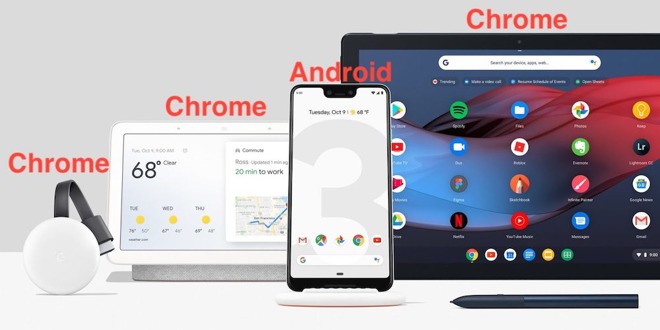
Chrome OS isn't at all new; it was introduced back in 2009 before Android had even gained much attention in smartphones. But the first Chromebooks didn't even ship until the middle of 2011. By that time the netbook market that Google was attempting to target with Chrome OS had been knocked out entirely by Apple's iPad.
With all demand for netbooks effectively gone, Google doubled down on its attempts at beating Apple's iPad via Android tablets, starting with an original notion of what Android tablets could be in partnership with Motorola; then reverting to making ultra-cheap, low-end tablets with Asus; then turning around and attempting to sell premium-priced iPad-knockoffs with HTC; then working to build an original tablet product with Pixel C, developed within the Create group. But none of these made any money.
In part, that's because Android offers a poor tablet experience, as its apps are mostly aimed at smaller phone screens. In contrast, Apple worked to make iPad a distinct platform running "tablet-optimized apps," rather than just stretched iPhone titles, contributing to a functional platform where developers can build more powerful apps, giving buyers new reasons to buy iPads.
Tech industry observers knew this but continued to talk about Android tablets as "winning" and having gained "market share," simply because it appeared that large numbers were being sold. The assumption was that these sales would eventually create a tablet platform supporting app development. However, Google and its partners kept destroying the existing base of Android tablet hardware as fast as they built new ones.
In part, this occurred due to their failing to support existing hardware with software updates, and in part by building low-end devices so poorly that many of them couldn't last in any usable form beyond a year. So while Android tablets supposedly enjoyed impressive unit sales, they didn't make any money and never created an installed base of satisfied tablet users with an appetite for apps or services in the pattern of Apple's iPad.
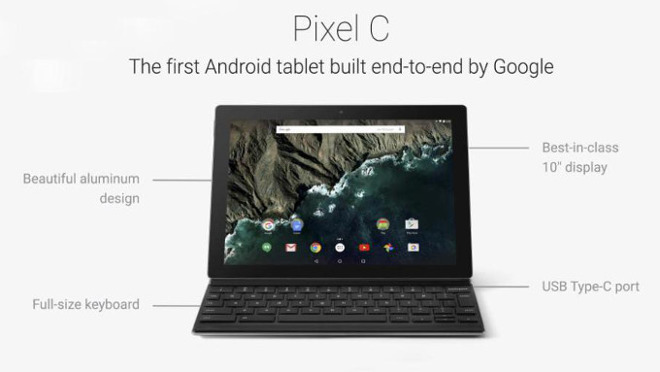
Pixel C was also Google's last Android tablet
After Google's last Android tablet failed, its Create unit focused entirely on Chrome OS, shipping a $999 Pixelbook in 2017, aimed directly at iPad Pro, and then last year's Pixel Slate, a $600 to $1600 Intel-powered device that looks more like a Microsoft Surface.
Google's newest Chrome OS tablet-netbooks were intended to pair the platform's native web apps with the new ability to also run Android mobile apps, even though a primary reason Android tablets had failed was because Android apps were such a poor fit on tablet hardware.
Last year, even the Verge called Google's new State "half-baked" and "slapdash," stating that its serviceable hardware was "undone by a hundred tiny software indignities."
When Google slashed the price of its most expensive Chrome OS Pixelbook by $450, nobody described it as a warning sign of failure for hardware that nobody wanted. Instead, the Verge simply called it a "good deal."
Compare the Wall Street Journal falsely claiming at around the same time that Apple's best selling iPhone XR was "failing Apple" and was a product "Apple can't sell." That happened after Bloomberg insisted that Apple was offering iPhone XR for "$300 less than it actually costs," because Apple was offering to accept trade-ins to incentivize sales of its full-priced, undiscounted new iPhones.
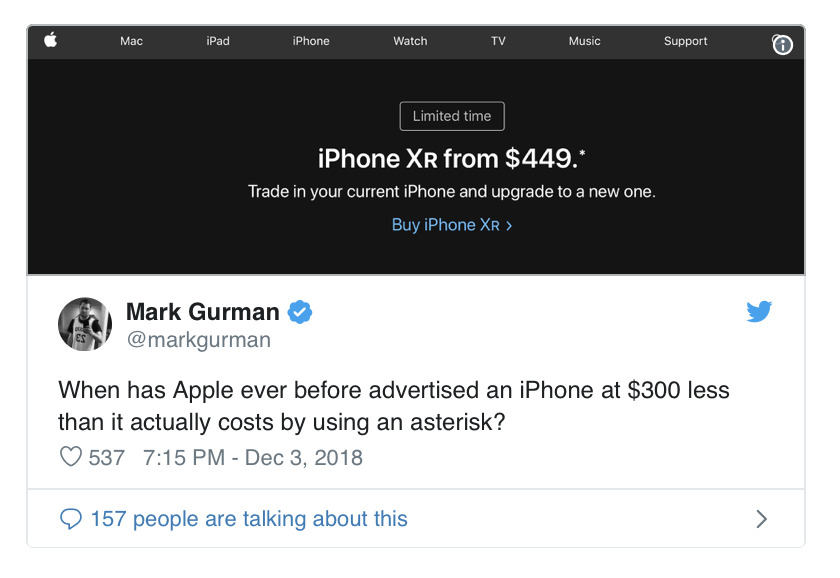
Apple was accepting trade-ins while Google was actually slashing prices
You couldn't craft such desperate slant into a movie screenplay and expect any audience to believe that such facile hogwash could be printed by real newspapers. Yet somehow a huge advertising giant didn't catch any flack for not actually being able to sell any of its tablets, netbooks, hybrid slates or any other inventions over the past decade of trying, nor for actually slashing hundreds of dollars from the price of its brand new hardware.
Chrome OS is not sufficiently powering any sales of premium priced hardware from Google or anyone else. Designing and supporting all of those models is also an expensive use of engineering talent that Google could be devoting to something that makes money. Yet the illusion remains that Chrome OS is still a functional business somehow.
That's largely due to a series of puff pieces initiated by Bloomberg, which created an impression that Chrome OS was "successful" in selling netbooks to K12 schools in the US. Never mind that that market is very small, and that the low end Chromebooks being sold there were not at all profitable.
In response to the news that Google's Create group was winding down its Chrome OS ambitions and scuttling plans for future hardware, Ben Bajarin tweeted, "Chromebook are the only category in the PC segment which is growing. Notably, not at prices/ASP Google charges but no reason Google couldn't [b]e more price competitive as a strategy."
That thinking focuses entirely on unit sales -- noting that some vendors are still shipping volumes of low-end Chromebooks -- but fails to grasp that Chrome OS, just like Android, is failing to create a resilient, enduring installed base of satisfied users.
Chromebooks don't last, aren't supported long, and must be replaced with cheap new hardware at a regular clip. As a recurring business model, replacement Chromebooks might make some sense if hardware makers were earning a profit on their low-end hardware. However, cheap Chromebooks are less profitable than PCs, regardless of whether they are growing slightly or not. Note that sales of PCs are down dramatically since the appearance of iPad, so "growing faster than conventional PCs" isn't much of a feat.
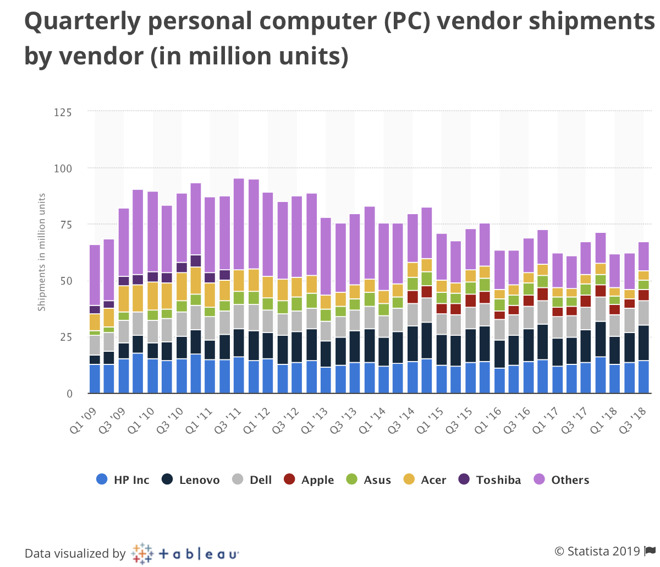
Source: Statistica.com
Further, outside of K12 education, Chromebooks haven't gained any traction among consumers or in the enterprise -- where Google once hoped they might. And of course, if Google can't make money at the prices it currently charges for its premium-priced Pixel branded Chrome OS devices, there quite clearly is "a reason" why Google can't simply lower its prices "as a strategy" to fit itself within the extremely unattractive competitive-commodity market for K12 Chromebooks.
Bizarrely, while Chrome OS isn't generating any real revenue for Google and can't even support future generations of vanity hardware, there's little effort to demand that the company stop wasting money on what has been a decade long failure. And yet at the same time, tech media thinkers have repeatedly suggested that Apple's Mac and iPad markets -- each of which has consistently generated roughly $20 billion annually -- are troubled businesses in decline that Apple should maybe just walk away from.
Apple may refresh iPad or Mac hardware at this month's event, but the focus appears to be on new services Apple will be offering to its vast installed base of Mac and iOS users. That's something that vendors focused only on quarterly unit sales can't do. After a lost decade, there is no real installed base of Chrome OS devices to sell anything to.
Google devoted a lot of engineering work into products nobody is buying
The unpredicted end of Android Tablets-- and now Chrome OS notebook-tablets
It was just one year ago that Google abandoned the last of its eight years of Android tablet initiatives. That span began with the official debut of Android 3.0 Honeycomb in 2011 and stretched to the abrupt end of support for Google's Pixel C running Android 8.0 Oreo last year.This week, Nick Bastone wrote for Business Insider that the search giant began reassigning engineers and program managers in its Create hardware division that builds its Pixelbook and Pixel State, both of which run Chrome OS.
Pundits have been constantly wringing their hands about the future of Apple's iPads and MacBooks, deeply concerned that they may end up hitting a plateau where Apple is merely servicing the same pool of the few hundred million users who can afford high end mobile devices.
However, nobody has been even slightly worried about the fact that every attempt Google has made in the hardware computing arena over the past decade has failed with spectacular embarrassment, making no money and gaining even less of a foothold in the market for personal computing hardware than Microsoft's Surface.
Across the entire stretch of years where Google has struggled to find a netbook, tablet, slate, notebook or some other form factor that it could sell with Android, Chrome OS or some mix of the two, it has only lost money and wasted time. Yet effectively nobody has ever predicted that Google would eventually give up on tablets or netbooks or other hardware experiments.
While Google has been patted on the back for a decade of trying, Apple's Macs and iPads have generated about $400 billion in sustainable margin revenues since 2010. With those funds, Apple has in part created its own internal Intel developing the latest A12X Bionic, and has funded a decade of coherent iOS development that has unseated Microsoft Windows as the world's largest proprietary computing platform.
iPad has actually shifted the nature of mobile computing for millions of consumers, professionals, and in the enterprise, while Apple's MacBooks have given the entire PC industry a pattern to closely follow. And still pundits are throwing out speculation that maybe Apple should just give up in hardware and stop building computers so it can be a Netflix, while suggesting that Google's failed Chromebooks and Android tablets are effectively neck and neck competitors.
Chrome OS aimed to take over from Android's tablet failures
Last October, AppleInsider noted that-- outside of phones-- Google has been distancing itself from Android and has been increasingly pursuing new strategies around Chrome OS: in TV dongles, WiFi microphones, stationary tablets, notebooks and netbooks.
Chrome OS isn't at all new; it was introduced back in 2009 before Android had even gained much attention in smartphones. But the first Chromebooks didn't even ship until the middle of 2011. By that time the netbook market that Google was attempting to target with Chrome OS had been knocked out entirely by Apple's iPad.
With all demand for netbooks effectively gone, Google doubled down on its attempts at beating Apple's iPad via Android tablets, starting with an original notion of what Android tablets could be in partnership with Motorola; then reverting to making ultra-cheap, low-end tablets with Asus; then turning around and attempting to sell premium-priced iPad-knockoffs with HTC; then working to build an original tablet product with Pixel C, developed within the Create group. But none of these made any money.
In part, that's because Android offers a poor tablet experience, as its apps are mostly aimed at smaller phone screens. In contrast, Apple worked to make iPad a distinct platform running "tablet-optimized apps," rather than just stretched iPhone titles, contributing to a functional platform where developers can build more powerful apps, giving buyers new reasons to buy iPads.
Tech industry observers knew this but continued to talk about Android tablets as "winning" and having gained "market share," simply because it appeared that large numbers were being sold. The assumption was that these sales would eventually create a tablet platform supporting app development. However, Google and its partners kept destroying the existing base of Android tablet hardware as fast as they built new ones.
In part, this occurred due to their failing to support existing hardware with software updates, and in part by building low-end devices so poorly that many of them couldn't last in any usable form beyond a year. So while Android tablets supposedly enjoyed impressive unit sales, they didn't make any money and never created an installed base of satisfied tablet users with an appetite for apps or services in the pattern of Apple's iPad.
Pixel C was also Google's last Android tablet
Chrome OS fails to rescue Google's massive investments in hardware
As Google's hopes for Android tablets collapsed into nothing, the company's Create group tried to migrate to Chrome OS. It is widely believed that the Pixel C was initially intended to ship with Chrome OS, but was switched to using Android at the last minute because Chrome OS wasn't quite ready, being limited to only running web apps.After Google's last Android tablet failed, its Create unit focused entirely on Chrome OS, shipping a $999 Pixelbook in 2017, aimed directly at iPad Pro, and then last year's Pixel Slate, a $600 to $1600 Intel-powered device that looks more like a Microsoft Surface.
Google's newest Chrome OS tablet-netbooks were intended to pair the platform's native web apps with the new ability to also run Android mobile apps, even though a primary reason Android tablets had failed was because Android apps were such a poor fit on tablet hardware.
Last year, even the Verge called Google's new State "half-baked" and "slapdash," stating that its serviceable hardware was "undone by a hundred tiny software indignities."
When Google slashed the price of its most expensive Chrome OS Pixelbook by $450, nobody described it as a warning sign of failure for hardware that nobody wanted. Instead, the Verge simply called it a "good deal."
Compare the Wall Street Journal falsely claiming at around the same time that Apple's best selling iPhone XR was "failing Apple" and was a product "Apple can't sell." That happened after Bloomberg insisted that Apple was offering iPhone XR for "$300 less than it actually costs," because Apple was offering to accept trade-ins to incentivize sales of its full-priced, undiscounted new iPhones.

Apple was accepting trade-ins while Google was actually slashing prices
You couldn't craft such desperate slant into a movie screenplay and expect any audience to believe that such facile hogwash could be printed by real newspapers. Yet somehow a huge advertising giant didn't catch any flack for not actually being able to sell any of its tablets, netbooks, hybrid slates or any other inventions over the past decade of trying, nor for actually slashing hundreds of dollars from the price of its brand new hardware.
The illusion of success for Chrome OS
After the liquidation of unsalable Pixelbooks, it's not hard to understand why Google is shuffling out its engineering talent from the Create group that was designed to think up new ways to sell Chrome OS with Android apps via custom-designed hardware.Chrome OS is not sufficiently powering any sales of premium priced hardware from Google or anyone else. Designing and supporting all of those models is also an expensive use of engineering talent that Google could be devoting to something that makes money. Yet the illusion remains that Chrome OS is still a functional business somehow.
That's largely due to a series of puff pieces initiated by Bloomberg, which created an impression that Chrome OS was "successful" in selling netbooks to K12 schools in the US. Never mind that that market is very small, and that the low end Chromebooks being sold there were not at all profitable.
In response to the news that Google's Create group was winding down its Chrome OS ambitions and scuttling plans for future hardware, Ben Bajarin tweeted, "Chromebook are the only category in the PC segment which is growing. Notably, not at prices/ASP Google charges but no reason Google couldn't [b]e more price competitive as a strategy."
That thinking focuses entirely on unit sales -- noting that some vendors are still shipping volumes of low-end Chromebooks -- but fails to grasp that Chrome OS, just like Android, is failing to create a resilient, enduring installed base of satisfied users.
Chromebooks don't last, aren't supported long, and must be replaced with cheap new hardware at a regular clip. As a recurring business model, replacement Chromebooks might make some sense if hardware makers were earning a profit on their low-end hardware. However, cheap Chromebooks are less profitable than PCs, regardless of whether they are growing slightly or not. Note that sales of PCs are down dramatically since the appearance of iPad, so "growing faster than conventional PCs" isn't much of a feat.

Source: Statistica.com
Further, outside of K12 education, Chromebooks haven't gained any traction among consumers or in the enterprise -- where Google once hoped they might. And of course, if Google can't make money at the prices it currently charges for its premium-priced Pixel branded Chrome OS devices, there quite clearly is "a reason" why Google can't simply lower its prices "as a strategy" to fit itself within the extremely unattractive competitive-commodity market for K12 Chromebooks.
Bizarrely, while Chrome OS isn't generating any real revenue for Google and can't even support future generations of vanity hardware, there's little effort to demand that the company stop wasting money on what has been a decade long failure. And yet at the same time, tech media thinkers have repeatedly suggested that Apple's Mac and iPad markets -- each of which has consistently generated roughly $20 billion annually -- are troubled businesses in decline that Apple should maybe just walk away from.
Apple may refresh iPad or Mac hardware at this month's event, but the focus appears to be on new services Apple will be offering to its vast installed base of Mac and iOS users. That's something that vendors focused only on quarterly unit sales can't do. After a lost decade, there is no real installed base of Chrome OS devices to sell anything to.







Comments
https://www.statista.com/statistics/266219/global-smartphone-sales-since-1st-quarter-2009-by-operating-system/
If FaceBook wasn't around and in the news...Google would be the 'sh*tiest' company.
Best.
P.S. Could it be mobile phones have replaced crappy desktops, crappy laptops and crappy tablets?
If anyone buys them, that’s on them...
Google doesn’t need to make money on hardware, their business is the Google Play Store/Music/Videos/TV etc.
That’s on top of ads... ads everywhere.
It doesn’t matter if one uses a Mac or a Chromebook to get to a web site. Once you get there, it works the same way regardless of the OS running locally. Those web-based applications are not designed for a touch interface. They are designed for a pointing device. Apple shoots itself in the balls by stubbornly continuing to ban the mouse from the iPad. That is the biggest reason why K12 buy Chromebooks and not cheap iPads with an external keyboard. People need a mouse to navigate a web site designed for a pointing device.
For whatever reason, Apple’s iTunes university didn’t take in K12. Apple’s framework for educational apps is not widely used either; at least not as widely as web-based curricula.
So, who cares if Google makes money on Chromebooks or not? Hardware is not Google’s core business. It’s Apple’s core business, though, and Apple doesn’t seem to care that they have lost the public education sector in the US.
Forever doomed.
I never understood why someone would pay so much money for a computer that only runs a web browser. Google cloud apps?
It’s just a shame that these things can exist only due to the desperation of companies worldwide to reach an audience with their advertisements. Google is smart, I guess, to take advantage, bringing useful products to the masses funded by satisfying the desires of every brand on earth to reach an audience.
The problem comes in not separating the church and state, so to speak; it becomes too tempting to plaster advertisements on thick everywhere there’s a bit of space to do so. And to push the line of how information gathered is utilized to better target audiences. It’s the reason Apple talks about privacy invasion, the reason FB is called before congress and Google has a certain ‘reputation.’ After all these years why is it that Google has not attempted to build, in parallel, a different business model that supports its services, but instead has raced to stay ahead of the Facebooks and others in directed advertisement? A company with the model ‘do no evil’ should at least give some credence to the notion of providing a path to its services that doesn’t involve the seduction of extreme data gathering about its customers lives. How about a new slogan, ‘be less creepy.’ Why isn’t Google disassociating itself with the whole notion of advertisement-funded services? It’s a hard idea to wrap itself around, I suppose, with so much money to be made continuing with the status quo.
The "Google makes reference designs" meme is as big as the "Apple products are form over function" meme.
Websites are designed for users to interact with almost exclusively using two actual input mechanisms: clicking (touching) and text input (requires a software or hardware keyboard). That's pretty much it.
Maybe you're unaware that iOS recently added an easier way to reposition a cursor in text? It always had a method for this, but iOS 12 introduced a more "mouse-like" way to do that. If that's the basis of your claim, then you're simply mistaken.
I'm looking forward to you supplying a few URLs of websites that won't work with fingers and keyboards. i can report them for not being ADA-compliant, and be eligible for a reward!
For a phone, it’s not great, but you can get by with it.
For a tablet, it just doesn’t make sense.
And for a computer, it’s utter crap.
People want a real os that supports real apps that can get real stuff done.
Its not right yoblay Mac prices for lesser hardware that only shops with a web browser.
Google should license windows or unix if they want customers. Even then, no one is going to trust then.
Their hardware sucks because they have no vision for it. They only see it as a Trojan horse to spy on you.
Not sure why Daniel doesn't get this. This is little more than whatabboutism.
They're working at it. An instance where "copying Apple" is a great thing.
Note that even Business Insider who posted the story (anonymous sources of course) says that in the near-term expect nothing to change with hi-end Chrome OS product plans hardware wise. But since the Pixel Slate is Google's most expensive hardware product (and a widely panned one too) they would likely be their slowest selling and most likely to be chopped. The Pixelbook on the other hand is still praised.
There's a wide field between "Apple:We're Number 1!!" and those at the very bottom of the heap. Everyone "not Apple" doesn't grade as an F, nor should the author confuse discontinuing the Pixel Slate or any other expensive Google manufactured Chrome hardware as discontinuing and no longer improving and supporting their Chrome OS used daily by millions of people.
Posted from my 2017 Pixelbook. My 2013 Chromebook Pixel is still good (at work) tho the battery life is now down to a couple hours between charges.
EDIT: On a somewhat related note (technically not OT as DED brought up smartphones too) my OG Pixel that shipped with Android 7, then getting 8 (Oreo) and then 9 (Pie) is in the process of being updated for Android 10 (Q*) in a bit of a surprise. I may wait one more year to buy another smartphone. TBH they haven't changed all that much in the last two or three, not enough to spend $600+ on another, and like some Apple users as long as the device is still being supported....